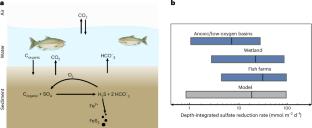Enhanced sulfide burial in low-oxygen aquatic environments could offset the carbon footprint of aquaculture production
IF 23.6
Q1 FOOD SCIENCE & TECHNOLOGY
引用次数: 0
Abstract
Carbon removal from the atmosphere is needed to keep global mean temperature increases below 2 °C. Here, we develop a model to explore how alkalinity production through enhanced iron sulfide formation in low-oxygen aquatic environments, such as aquaculture systems, could offer a cost-effective means of CO2 removal. We show that enhanced sulfide burial through the supply of reactive iron to surface sediments may be able to capture up to a hundred million tonnes of CO2 per year, particularly in countries with the highest number of fish farms, such as China and Indonesia. These efforts could largely offset the carbon footprint associated with their aquaculture industry. Enhanced sulfide burial could directly benefit both fish farms and surrounding ecosystems by removing toxic sulfide from aquatic systems, providing an addition to durable global CO2 removal markets and a path towards large-scale, carbon-neutral aquatic food production. A model simulating the carbon cycle in low-oxygen aquatic environments suggests a potential pathway to increase alkalinity production and carbon dioxide uptake, offering an affordable and scalable method of carbon capture in aquaculture systems.


在低氧水生环境中加强硫化物掩埋可抵消水产养殖生产的碳足迹
要将全球平均气温升幅控制在 2 ℃ 以下,就必须从大气中去除碳。在这里,我们建立了一个模型来探索如何通过在低氧水生环境(如水产养殖系统)中强化硫化铁的形成来产生碱度,从而提供一种具有成本效益的二氧化碳去除方法。我们的研究表明,通过向表层沉积物提供活性铁来强化硫化物埋藏,每年可捕获多达一亿吨的二氧化碳,尤其是在中国和印度尼西亚等养鱼场数量最多的国家。这些努力可以在很大程度上抵消与水产养殖业相关的碳足迹。强化硫化物掩埋可通过清除水生系统中的有毒硫化物,使养鱼场和周围生态系统直接受益,为持久的全球二氧化碳清除市场增添新的活力,并为实现大规模、碳中性水生食品生产提供一条途径。
本文章由计算机程序翻译,如有差异,请以英文原文为准。
求助全文
约1分钟内获得全文
求助全文

 求助内容:
求助内容: 应助结果提醒方式:
应助结果提醒方式:


